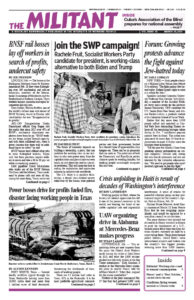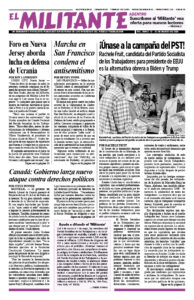“The expansionist war of the Russian regime has ruined the lives of millions of Ukrainians, deprived them of their homes and forced them to seek safety and shelter in other regions of Ukraine and beyond its borders,” the Confederation of Free Trade Unions of Ukraine noted in a March 8 statement marking International Women’s Day. The union featured remarks on the KVPU website from three Ukrainian women union members about what Moscow’s invasion has meant, especially for women workers across the country.
“For me, a resident of the Luhansk region, the war began back in 2014,” said Lidiya Galkina, chair of the Independent Trade Union of Miners of Ukraine at the Toshkivska mine. Although the sounds of enemy shelling became “commonplace,” all the mines there operated almost uninterruptedly.
But in June 2022, Moscow’s invading forces “destroyed my home, the settlement, and the production facilities [and] all the mines.” Almost 5,000 people were made homeless. Many miners who “lost all their property still have unpaid wages.”
Galkina said many mining families found refuge in the nearby Dnipropetrovsk region, while “some miners heroically defend our land on the front lines.” She organizes fellow volunteers to make camouflage nets for the Ukrainian army.
“One-third of the men” from the Kametstal iron and steel works in Kamianske, near the major city of Dnipro, “are currently on the front lines, risking their lives for the freedom and independence of Ukraine,” said Svitlana Kuzminykh, deputy head of the trade union Metalistiv there. They are defending the country and “the dream of a better future,” as they fight an enemy with more manpower and weaponry.
“During these dreadful years,” she added, “we have lost 31 defenders, and seven boys are considered missing in action.”
What the Ukrainians have, all three women made clear, is a cause they are determined will win out — the independence of their country.
The men who have joined the armed forces are now being replaced by women, who have “started to work in ‘traditionally’ male positions” at many stages of the production process, Kuzminykh said. Women work overtime, including weekends and holidays, while “at home, they have children who also need attention and protection.”
For the first time, hundreds of women have started working underground in Ukraine’s mines. This is on top of tens of thousands of women who have joined the country’s armed forces.
The women said they don’t complain about the difficulties and challenges, Kuzminykh said, “because we all live in hope for victory.”
Vira Bulankina, a member of the Free Trade Union of Railway Workers of Ukraine at the Kharkiv Passenger Wagon Depot, described how “in the first days of the war, Russian invaders started to shell and bomb Kharkiv.” Amid the destruction “most of the city’s transportation was damaged and disabled.”
During this period, many Kharkiv residents sought to leave the city. It is Ukraine’s second largest city and is less than 20 miles from the Russian border. “The railway station turned into a turbulent stream of people,” Bulankina said. “There were not enough trains, cars, or seats not only in the wagons but also at the station. People traveled sitting on the floor.” Many rail workers stayed on the job for days without rest “to help the army and the city residents.”
Despite the shelling and dangers, many Kharkiv residents are returning to their native city. In two years of war the railway settled into a steady operation, but with “the flow of passengers decreased by tens of times.”
“We will not be broken!” Galkina, the miners’ union official, said, speaking for all three.

